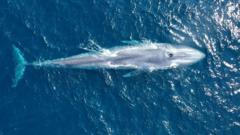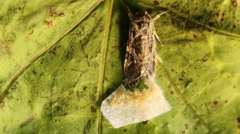In the azure waters of the South Pacific Ocean, an inspiring collaboration is taking place in Timor-Leste between local fishermen and marine scientists. Each year, for approximately two months, Faustino Mauloko da Cunha and his son, Zacarias, navigate the sea, seeking the majestic pygmy blue whales that journey along the coast. Equipped with binoculars and a telephoto camera, they help record sightings, which quickly mobilizes a dedicated team back at their home in Subaun.
Once a sighting occurs, a drone is sent into the sky to capture high-quality photographs, guided by Australian marine ecologist Karen Edyvane who leads the project. Over the past decade, this grassroots endeavor has successfully documented nearly 3,000 pygmy blue whales, a commendable figure given the species' elusive nature.
Timor-Leste boasts one of the world's most diverse marine mammal populations, especially during migration seasons in October and November, when these colossal creatures travel thousands of kilometers from southern Australia towards the Banda Sea. Yet, Prof. Edyvane notes that much of the area remains unexplored. Since initiating the program in 2014, she has collaborated with local fishermen, students, and dive operators to gather invaluable information on the reproductive behaviors of the whales, including intimate moments like a mother nursing her calf.
The initiative took off as a Facebook group, rallying local volunteers keen on documenting the whales' lives. Prof. Edyvane empowered these citizen scientists by teaching them effective survey techniques and providing access to necessary equipment for both aerial and boat surveys. Real-time updates are shared through social media, igniting excitement within the community every time a new sighting is reported.
In 2016, the team partnered with a dive tour operator to launch whale-watching tours, creating a new avenue for both research and tourism. A dedicated research station has also been established outside the da Cunha family home, allowing for continuous monitoring of the waters. Prof. Edyvane expressed enthusiasm about the incredible footage captured during this year's whale season and highlighted the beneficial partnership between citizen scientists and professionals.
The research activities have proliferated tourism in Subaun, where the demand for tours has escalated. While local non-profits caution about potential risks tied to unregulated whale tourism, the government has expressed intentions to utilize Prof. Edyvane's findings to develop protective measures for marine life in Timor-Leste.
With proper regulation, whale tourism could generate employment opportunities and invigorate the local economy, allowing families like the da Cunhas to diversify their income sources. Besides fishing, they now prepare meals for tourists using local ingredients. Zacarias is also gaining skills as a drone operator and plans to share knowledge through educational talks.
The ongoing collaboration between citizen scientists, marine researchers, and the community illustrates that grassroots initiatives are not only enhancing our understanding of marine ecosystems but also promoting sustainable practices that help balance economic growth with environmental stewardship.






















